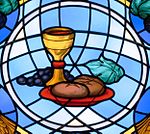This article needs additional citations for verification. (January 2023) |
| Part of a series on the |
| Eucharist |
|---|
 |

Eucharistic theology is a branch of Christian theology which treats doctrines concerning the Holy Eucharist, also commonly known as the Lord's Supper and Holy Communion.
In the Gospel accounts of Jesus' earthly ministry, a crowd of listeners challenges him regarding the rain of manna before he delivers the famous Bread of Life Discourse (John 6:22–59),[1] and he describes himself as the "True Bread from Heaven".[2] The aforementioned Bread of Life Discourse occurs in the Gospel of John, John 6:30–59.[3] Therein, Jesus promises to give his flesh and blood, which he states will give eternal life to all who receive it. In John 6:53 (RSV), Jesus says, "Truly, truly, I say to you, unless you eat the flesh of the Son of man and drink his blood, you have no life in you"; in verses 54–55, he continues: "he who eats my flesh and drinks my blood has eternal life, and I will raise him up at the last day. For my flesh is food indeed and my blood is drink indeed."
Every year, Jews in Israel celebrated the Passover Meal, remembering and celebrating their liberation from captivity in Egypt. In the Gospel of John, Jesus is recorded as celebrating the Last Supper with his Apostles at Passover.
Saint Paul, in his First Letter to the Corinthians (1 Corinthians 11:23–26),[4] as well as the Synoptic Gospels of Matthew (Matthew 26:26–28),[5] Mark (Mark 14:22–24),[6] and Luke (Luke 22:19–20),[7] state that Jesus, in the course of the Last Supper on the night before his death, instituted the Eucharist, stating: "This is my body", and "This is my blood". For instance, Matthew recounts: "And as they were eating, Jesus took bread, and blessed it, and brake it, and gave it to the disciples, and said, Take, eat; this is my body; And he took the cup, and gave thanks, and gave it to them, saying, Drink ye all of it; For this is my blood of the new testament, which is shed for many for the remission of sins."
The Gospel of John, on the other hand, makes no mention of this. One explanation offered is that the author of the Gospel of John intended the Gospel to supplement what other evangelists had already written.[8][9]
- ^ John 6:22–59
- ^ The Gospel According to John: A Literary and Theological Commentary by Thomas L. Brodie 1997 ISBN 0-19-511811-1 p. 266
- ^ John 6:30–59
- ^ 1 Corinthians 11:23–26
- ^ Matthew 26:26–28
- ^ Mark 14:22–24
- ^ 22:19–20
- ^ Cooke, Richard (2009). New Testament. Hymns Ancient and Modern Ltd. p. 364. ISBN 9780334040606. Retrieved 20 January 2015.
- ^ Unger, Merrill F. (2005). The New Unger's Bible Handbook. Moody. p. 444. ISBN 9781575676340. Retrieved 20 January 2015.
